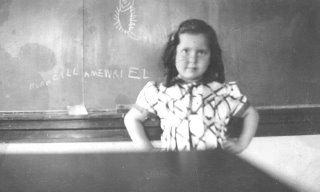
Opening the small package to find three beautiful proof and copyright copies of my own book, with my name on the front cover and my picture on the back of each, was a major highlight of my life. When the books arrived in early May, 2006, it was more exciting than winning a lottery. I hope most writers don't wait seventy-some years for this experience, but there is really no time limit. It's never too late to write and publish a book, as I have proved. My book is
Reinventing Myself: Memoirs of a Retired Professor (Infinity Publishing, May 2006).
I was a long-time community college English teacher. I've heard that most English teachers are either frustrated actors or frustrated writers, and if so, I belonged to the writer group. However, I did not teach at a publish-or-perish institution, and I kept very busy grading papers and preparing classes and serving on committees. In my last seven years of teaching, I was a busy department chair. I wrote and published a few short teaching-related articles, and I enjoyed doing so, yet I didn't feel like a writer.
To me, being a writer meant writing incredibly beautiful prose that flowed easily from pen or computer into beautifully-printed works of art. I admired authors from Shakespeare to Dickens to Twain to E.B. White, Alice Walker, and hundreds more. Yes, I really knew that writing involved hard work, but I chose to ignore that. I lacked the courage to try.
The turning point came in late December, 2005, when I returned from a pleasant holiday visit with extended family in Texas to an empty condo. By then, I had been retired for seven years and widowed for six. My beloved old cat, Lyon, had died at an animal hospital while I was away, and now I was really alone.
In an Internet search, I found StoryStudio Chicago, and since the beginning creative writing classes were filled, I enrolled in LifeWriting. I decided to write about what I know best, my life. The class motivated me to write and keep writing for eight weeks. I enjoyed sharing my work with my younger classmates, and I enjoyed hearing their work. Completing a book in eight weeks was not the assigned goal of the class, but I tried it anyway.
I had plenty of time to write, and writing, especially in the early morning hours, seemed to revive me. Words did not flow from my pen or computer in perfect order, but I revised and edited and revised again. I filled my wastebasket many times with discarded attempts. I also rediscovered a few essays I'd written as early as 1988, as well as a lecture on poetry and a commencement address I'd given in 1996. I began to envision not a chronological story of my life, but a series of personal essays old and new that told my story and encouraged others to write.
I really wanted to publish this book, but I realized that traditional publishers would not be eager to take a chance on a memoir by a new, unknown, elderly writer. For me, becoming rich or famous was not a priority, but of course publishers are in business to make money, as they must be. I began to explore the complicated world of self-publishing. Self-publishing had always been treated with disdain in my academic world, and I'd heard horror stories of exorbitant fees and writers' basements full of low-quality, unsold books. Still, computers seem to have changed the self-publishing world.
I discovered that I could publish my book for a reasonable fee that included cover design, retain all rights, and avoid any requirement to purchase copies. Of course I got no free copies beyond the proof copies either, but I didn't mind that. I could buy five or ten or one hundred copies as I chose, my first order at half-price and future orders at forty percent off. If the book sold, I would get modest royalties, even for those copies I sold myself, and if it did not sell, I was out only what I had already paid. Books, in addition to a very small publisher's inventory, could be printed on demand very quickly, and the book would never go out of print unless I chose to withdraw it, which I could at any time. I would be free to go to a traditional publisher if one showed interest later.
For me, independent former English professor and computer enthusiast that I am, it was thrilling to format the book myself according to the publisher's specifications, scan my own pictures, do my own editing and proofreading (with marvelous help from a friend), and submit my book in PDF format on a CD. I had total control. I didn't need to pay for editing or proofreading or formatting, although they are available and may be necessary for some authors.
That beautiful proof copy contained a few errors, of course. Still, making the corrections in my original
Word file and submitting a new PDF disc was easy. I won't claim perfection, but except for one unintentionally convoluted sentence and one minor typo, I haven't found any errors in the finished book. I'll trust my readers to find any others that remain.
My book was finished by late March, the proof copies arrived in early May, and my book was published on May 24. I know it won't be a best seller, but just seeing it mentioned on various Internet sites is a thrill. The sales results will come later, but I've already achieved success on my own terms.
For me, self-publishing was a good experience. Seeing the proof book and then the final copies, selling a few copies myself, talking to old and new friends about the book, learning about promotional possibilities on various web sites: writing and publishing restored my enthusiasm and my enjoyment of life. That's why my title begins with "Reinventing Myself." I hope others will follow my example. It's never too late.
Copyright 2006 by Marlys Marshall Styne
 My first photo album (one of many) dates back to the late 1930's. The first photo in the album, apparently taken at school when I was about six or seven and in the first grade, shows me standing behind a desk and in front of a blackboard, hands on my hips (or what would later become hips), staring straight ahead with a look of pride and determination that seems to say, "So there!" or "Look at what I did!"
My first photo album (one of many) dates back to the late 1930's. The first photo in the album, apparently taken at school when I was about six or seven and in the first grade, shows me standing behind a desk and in front of a blackboard, hands on my hips (or what would later become hips), staring straight ahead with a look of pride and determination that seems to say, "So there!" or "Look at what I did!"

















